Based on our users’ request, we developed a new opening course for beginners, and online players, called “Active opening repertoire“. We still recommend that first, you learn the logic behind chess and the basic moves from our Beginner course, before mastering any openings. Moreover, a solid middlegame and endgame knowledge are also essential, which you can learn from the Intermediate and Advanced courses.
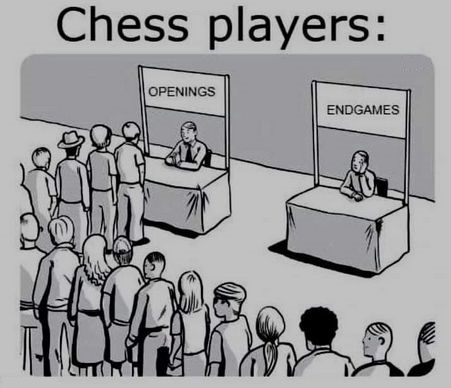
However, if you want to become a successful player in today’s computerized chess world, you also need to put emphasis on your opening strategy. That is why we launched the “Active opening repertoire” in September 2020.
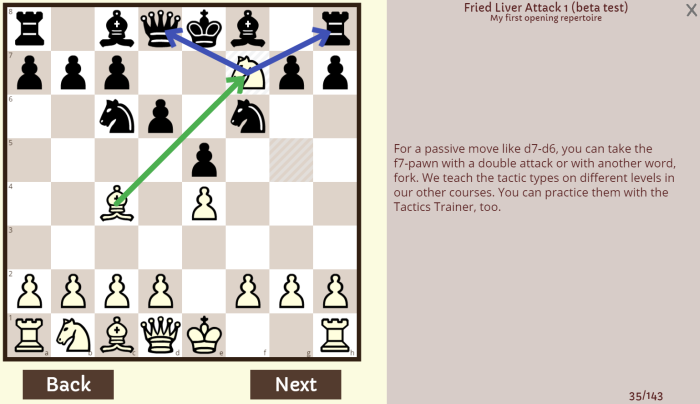
More understanding and less memorization
The keyword in all LearninChess courses is “interactivity for better understanding”, and that is what we focus on in the Opening Course as well. You have to answer different types of questions during the learning process, which helps you to understand the lessons much better. In our opinion, this interactive method is more effective and more fun than the dull “brute force” memorization by repetitions process. Of course, high-quality videos and books are also enjoyable. Still, as you are not actively taking part in the learning process, over-time, they become less effective.

The course will contain 36 lessons. GM Jozsef Pinter – our head coach – selected mostly tactical lines to the repertoire as we firmly believe these are the most suitable ones for beginners and children.
The Openings
Our head-coach, GM Jozsef Pinter, only selected openings where you can play actively for the win. There are many gambit lines in the repertoire, such as Evans-gambit and Morra-gambit.
You get thorough opening knowledge with white and black from this course. Choose it as your first opening repertoire or for playing online games. You will not be disappointed for sure!

Structure
Each lesson contains four parts:
Theory part: We introduce the main and sidelines of the opening with explanations and memory training. The student takes part in the learning process actively and is not only repeating the showed moves.
Short game: The user can take a look at a short game with typical lines from the given opening. It’s a kind of move-by-move task with many explanations and hints. We disclose opening traps and introduce the typical plans and goals at the transition to the middlegame during the game.
Key positions – repetition: We summarize all the key positions in the lesson here.
Knowledge test: This is a test where the user has to play his/her repertoire moves in the main line without any help. There is also a surprise exercise at the end.
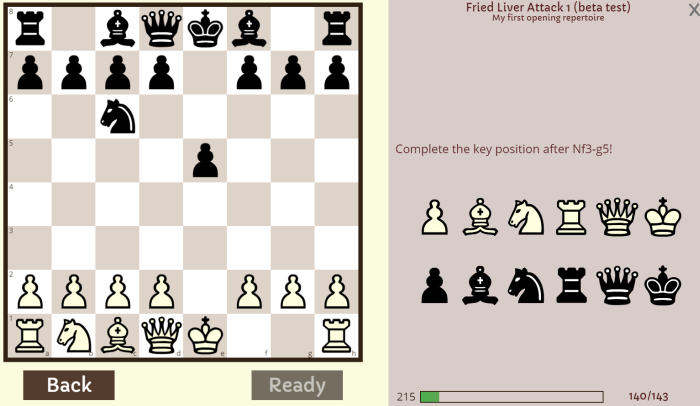
Are you already curious? You can try the lessons here.
Thank you
LearningChess Team
ČESKÁ VERZE (CZECH VERSION)
Aktivní repertoár zahájení
Nový kurz dorazil do České republiky
Tento kurz jsme vyvinuli pro začátečníky a online hráče. Stále doporučujeme, abyste se nejprve naučili logiku šachu a základní tahy z našeho kurzu pro začátečníky, než se pustíte do tajů zahájení. Kromě toho jsou nezbytné také solidní znalosti střední a koncové hry, které můžete získat v kurzech pro mírně pokročilé a pokročilé.

Pokud však chcete být úspěšným hráčem v dnešním počítačovém světě šachu, musíte klást důraz i na svou strategii zahájení. Proto jsme v prosinci 2025 spustili „Aktivní repertoár zahájení“ v českém jazyce. Děkujeme za překlad Šachovému svazu České republiky.
S potěšením oznamujeme, že kurz Aktivní repertoár zahájení byl přidán pro české studenty LearningChess a uživatele s platnou licencí s plným přístupem.
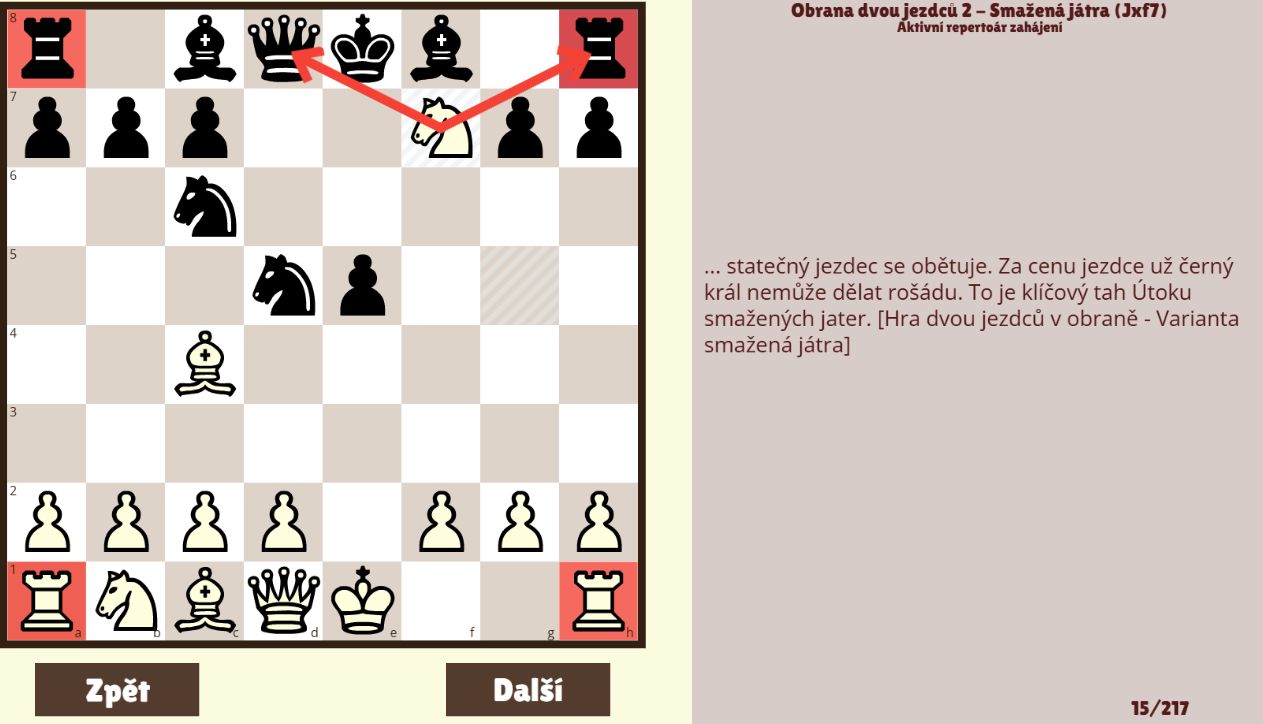
Klíčovým mottem všech kurzů LearningChess je „interaktivita pro lepší porozumění“ a na to se zaměřujeme i v kurzu Úvod do šachu. Během výuky musíte odpovídat na různé typy otázek, což vám pomůže lépe porozumět lekcím. Podle našeho názoru je tato interaktivní metoda efektivnější a zábavnější než nudné „biflování“ variant, postavené na neustálém opakování. Samozřejmě, že kvalitní videa a knihy mají své místo. Jelikož se však při nich aktivně neúčastníte výuky, časem ztrácejí na účinnosti.

Kurz obsahuje 36 lekcí. GM József Pinter – náš hlavní trenér – vybral do repertoáru převážně taktické varianty.
Zahájení
Náš hlavní trenér vybral pouze ta zahájení, ve kterých můžete aktivně hrát na výhru. Repertoár obsahuje mnoho gambitů, například Evansův gambit nebo Morra gambit, protože jsme pevně přesvědčeni, že jsou pro začátečníky a děti nejvhodnější.
Každá lekce obsahuje čtyři části:
Teoretická část: Představuje hlavní a vedlejší úvodní varianty vysvětlením a tréninkem paměti. Student se aktivně zapojuje do procesu učení a neopakuje pouze předvedené pohyby.

Krátká partie: Uživatel si může projít krátkou partii s typickými tahy z daného zahájení. Jde se hezky tah po tahu s četným komentářem a nápovědou. Odhalujeme pasti v zahájení a představujeme typické plány a cíle při přechodu do střední hry.
Klíčové pozice – opakování: Zde shrnujeme všechny klíčové pozice z této lekce.
Zkouška znalostí: Jedná se o test, ve kterém musí uživatel bez jakékoli pomoci zahrát tahy svého repertoáru v hlavní variantě. Na konci také bývá bonusový úkol.
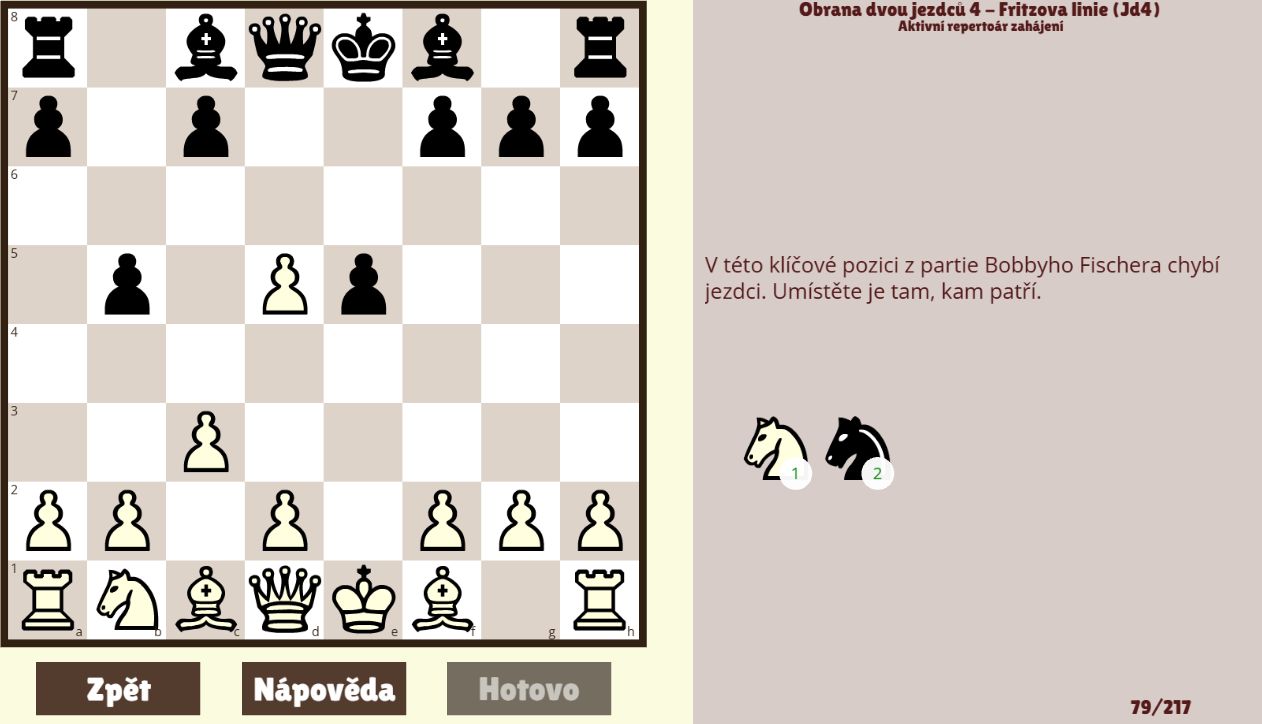
Jste již zvědaví? Lekce si můžete vyzkoušet zde.
Děkujeme.
Tým LearningChess


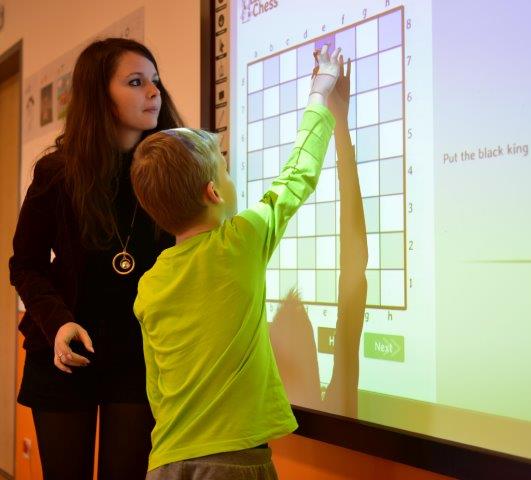
Guinefolleau
April 28, 2020 at 7:51 pm
Very interesting!
Paschal from Ireland
May 3, 2020 at 4:03 pm
I tried the first lesson and I am very enthused with this new development. I also loved the surprise exercise at the end; it really got my full attention. Yes, this course is certainly interactive and quite challenging in a fun way.
Nikola Kireta
May 11, 2020 at 4:44 pm
I tried the lesson. It would be great for me.
Greg G
May 15, 2020 at 4:55 pm
I believe it is a great continuation to the 3 level current lessons.
Aarav
May 28, 2020 at 3:10 pm
Great.
Brian
May 31, 2020 at 12:06 pm
Really good interactive system! Very much looking forward to the August release!
JohnnyP
May 31, 2020 at 12:51 pm
Thank you. We are on it! Our beta testers get the new lessons weekly.
John Webster
July 21, 2020 at 11:12 am
I think this is a great addition to the learning programme. I particularly enjoyed the move by move guidance.
JohnnyP
July 21, 2020 at 1:24 pm
Thank you for your comment. We are working hard with our beta-testers to open the course latest in early September. Stay tuned! 🙂
Steve
January 15, 2022 at 9:19 pm
It is great but there is no coverage against 1.Nf3 and 1.g3 or 1.g4 which people may occasionally face in a tournament.
JohnnyP
February 14, 2022 at 12:22 pm
Hi Steve, thank you for your comment. I hope we give the necessary information during the lessons to fight against rare and irregular openings, such as g4,h4,a4, etc., with healthy developing moves. The Nf3, g3 lines will transpose in 99% to other lines we explain in the ‘Queen’s gambit accepted – Qa4+ and g3 variations’, ‘Tarrasch defense against the English opening’ and ‘Flank opening (1.b3 or b4)’ lessons.